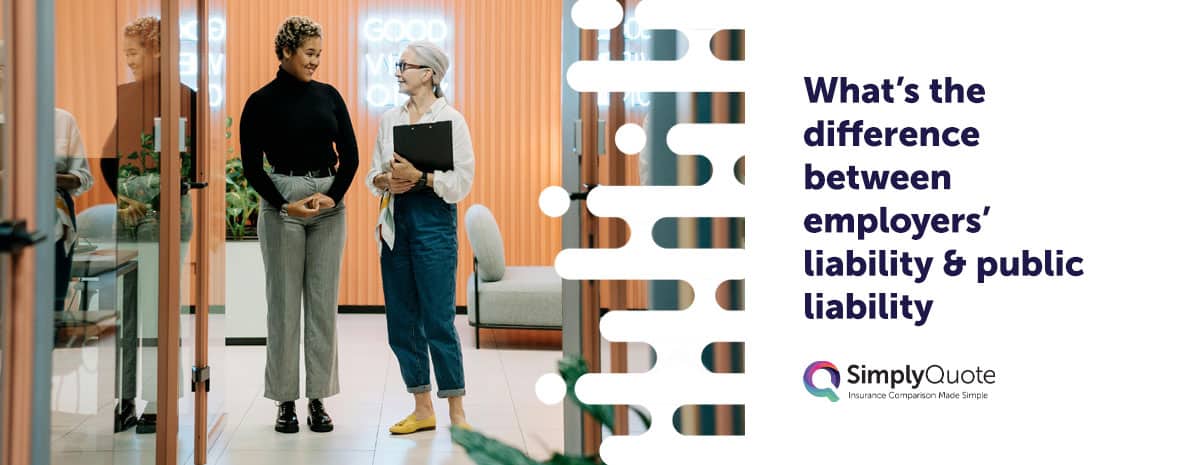What’s the difference between employers’ liability & public liability insurance?
Employers’ liability insurance protects your business if an employee is injured or becomes ill due to their work. Public liability insurance protects you if a member of the public is injured or their property is damaged because of your business activities.
That’s the headline difference—and for many UK businesses, it’s a critical one. These two types of insurance often get grouped together, but they serve very different purposes, and in many cases, you’ll need both.
Employers’ liability is legally required if you employ anyone, even on a casual, part-time, or voluntary basis. Public liability, on the other hand, is not compulsory, but it’s widely considered essential for businesses that interact with the public—like tradespeople, shop owners, mobile therapists, or event organisers.
Still unsure which applies to your setup? This guide will walk you through what each policy covers, how they differ, and whether your business could be exposed by not having one—or both—in place.

What is employers’ liability insurance?
Employers’ liability insurance protects your business if an employee is injured or becomes ill as a result of their work—and it’s a legal requirement in the UK if you employ anyone.
It covers compensation costs, legal fees, and medical expenses tied to workplace-related incidents.
This cover applies whether the employee is full-time, part-time, temporary, or even a volunteer. As long as someone is working under your supervision or direction, you’re likely required to have it.
Under the Employers’ Liability (Compulsory Insurance) Act 1969, most UK businesses must have at least £5 million in cover, with many insurers offering £10 million as standard. Failure to hold a valid policy can result in fines of up to £2,500 per day.
Here are common claim examples:
- A café worker slips on a wet kitchen floor and breaks their wrist.
- An office assistant develops repetitive strain injury from poor workstation setup.
- A labourer suffers back damage due to inadequate lifting procedures.
Even in low-risk environments, accidents happen. Employers’ liability ensures you’re protected—not just legally, but financially—if a member of staff decides to make a claim against you.
Looking to compare employers liability insurance? Get your quote today!
Get QuotesWhat is public liability insurance?
Public liability insurance protects your business if a member of the public is injured or their property is damaged as a result of your work.
It covers legal fees, compensation claims, and associated costs if someone decides to take legal action against you.
This includes clients, customers, suppliers, or even passers-by. It’s particularly important for businesses that deal with the public—whether you’re a shopkeeper, plumber, beauty therapist, or event organiser.
Unlike employers’ liability, it’s not a legal requirement. But that doesn’t make it optional in practice. Many councils, venues, landlords, and clients require proof of public liability insurance before allowing you to trade, operate, or enter a contract.
Here are common claim examples:
- A customer slips on a wet floor in your café and breaks their ankle.
- You accidentally damage a client’s front door while delivering equipment.
- A member of the public trips over your stall cables at an outdoor market.
Cover limits typically start at £1 million, but £2 million or £5 million are common—especially for
public-facing businesses. And if you’re bidding on local authority or government work, expect to be asked for up to £10 million in cover.
How do employers’ and public liability policies compare?
Employers’ liability insurance and public liability insurance cover different risks—one protects your team, the other protects the public.
If you’re unsure which you need (or if you need both), this breakdown makes the distinction clear.
Here’s how they compare:
| Feature | Employers’ Liability Insurance | Public Liability Insurance |
|---|---|---|
| Who’s Covered? | Employees (full-time, part-time, temporary, volunteers) | Clients, customers, suppliers, members of the public |
| Is It Legally Required? | Yes – if you employ anyone | No – but often contractually required |
| Typical Cover Limit | Minimum £5 million (often £10 million) | £1 million to £10 million, depending on contract or risk level |
| What It Covers | Work-related injury, illness, or disease to employees | Injury to third parties or damage to their property |
| Examples of Claims | Staff injury from unsafe equipment, slips, or long-term strain | Customer trips, property damage, injury caused by business setup |
| Who Needs It? | Any business with staff (including unpaid helpers) | Any business interacting with the public—trades, retail, events |
The key takeaway? If you have employees, you must have employers’ liability. If you interact with the public, public liability is highly advisable—and often mandatory for venues, suppliers, and contract work.
Do I need both employers’ and public liability insurance?
If your business has employees and interacts with the public, you almost certainly need both employers’ and public liability insurance.
One is a legal obligation; the other is a practical safeguard against public claims.
Here’s how to think about it:
- If you employ staff—even part-time, temporary, or unpaid—you’re legally required to hold employers’ liability insurance. This includes volunteers, apprentices, and even family members working in a formal role.
- If you work in public-facing environments—such as a café, salon, construction site, or market stall—public liability cover is essential. In fact, many venues, clients, or local authorities won’t let you operate without it.
Examples where both are needed:
- A hair salon with two employees and walk-in customers
- A self-employed builder with subcontractors on site and homeowners present
- An events company setting up temporary infrastructure in public spaces
If you’re a solo freelancer working from home with no in-person contact or staff, you might not need either policy. But the moment someone helps you—or sets foot in your workspace—your risk profile changes.
The bottom line: assess who you work with, where you work, and who could be affected. That will tell you what protection you need.
Looking to compare public liability insurance? Get your quote today!
Get QuotesHow do I get employers’ and public liability insurance?
Most UK business insurers offer employers’ and public liability insurance as standalone policies—or bundled together as part of a combined business insurance package.
You can buy them online, through a broker, or as part of your existing cover.
Here’s how to approach it:
- Combined policies are ideal if you need both covers. They simplify paperwork, reduce admin, and can often lower the overall premium.
- Standalone employers’ liability is harder to find on its own, as it’s typically bundled with other business covers—especially when required by law.
- Public liability is easier to buy individually, but coverage limits, excess, and exclusions vary widely. Always check whether it includes product liability or tools cover if relevant to your trade.
What affects the cost?
- Number of employees
- Nature of your work (e.g. construction vs. consultancy)
- Turnover and public footfall
- Claims history
- Level of cover required (e.g. £2 million vs. £10 million)
It’s worth comparing quotes from a few providers—or using a broker if your business operates in a high-risk sector.
Whether you’re just starting out or scaling up, getting the right protection in place means fewer surprises later—and a lot less stress when the unexpected happens.
Final thoughts
Employers’ and public liability insurance may cover different people—but both serve the same purpose: protecting your business from the unexpected.
If you employ staff, employers’ liability isn’t optional—it’s the law. If you work with customers, clients, or the public in any way, public liability isn’t legally required, but in practice, it’s essential. One protects your team, the other protects your reputation.
Understanding the difference isn’t just about compliance—it’s about confidence. And once you know what you need, getting the right cover is simpler than it sounds. Whether you’re a startup, a growing contractor, or an established team, the right insurance won’t just protect your business—it’ll help it move forward with certainty.
Frequently Asked Questions (FAQs)
Yes. If you employ anyone in the UK—even part-time or casually—you must have employers’ liability insurance by law.
Yes. You can be fined £2,500 for each day you’re not properly insured, and £1,000 for failing to produce your certificate when asked.
The legal minimum is £5 million, but many insurers provide £10 million as standard to meet commercial and contractual needs.
Only if they employ others. Sole traders with no staff typically don’t need employers’ liability insurance, but may still need public liability cover.
You may still need employers’ liability cover if those contractors work under your direction. Legal obligations depend on the working relationship.
Yes. It’s considered a business expense and can usually be claimed against your taxable profits.
You’re still legally required to have employers’ liability insurance if you supervise volunteers—even if they’re unpaid.
No. Injuries to employees are only covered under employers’ liability insurance—not public liability.
